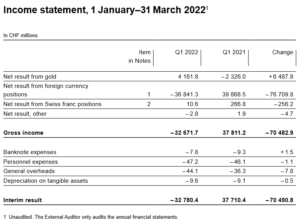In my remarks today, I will present the key findings from the new Financial Stability Report, published this morning by the Swiss National Bank.
Economic environment
In the period between the publication of the last Financial Stability Report and the end of 2021, economic and financial conditions for the Swiss banking system remained favourable. GDP has returned to, or even exceeded, pre-crisis levels in most countries and unemployment rates have receded globally. Corporate ratings have improved and credit quality has remained high. However, these conditions have recently become more challenging, due to both the war in Ukraine and rising inflation around the world.
As my colleague Thomas Jordan has explained, the SNB’s baseline scenario assumes that the impact of
Articles by Fritz Zurbrügg
Introductory remarks by Fritz Zurbrügg
June 21, 2018Fritz Zurbrugg – Click to enlarge
In my remarks today, I will present the key findings from this year’s Financial Stability Report, published by the Swiss National Bank this morning. In the first part of my speech, I will talk about the big banks, before going on, in the second part, to outline our current assessment of the situation at domestically focused banks.
Big banks
In October 2018, it will be ten years since the Federal Council, FINMA and the SNB decided to implement far-reaching measures to strengthen the Swiss financial system. These measures were needed during the global financial crisis as the possibility of UBS suffering a deeper crisis of confidence could not be ruled out. This would have resulted in
News conference Swiss National Bank 2017, Fritz Zurbrügg
December 14, 2017Fritz Zurbrügg, Vice Chairman of the Governing Board of the Swiss National Bank
News conference of the Swiss National Bank, Berne, 14.12.2017
Fritz Zurbrugg – Click to enlarge
Introductory remarks by Fritz Zurbrügg
In my remarks today, I would like to address some of the developments currently taking place in the field of financial stability. I shall look at the big banks first before turning to the
domestically focused banks. I will conclude with a few words on the new banknote series.
Big banks
As Thomas Jordan has already noted, the international economic environment has continued to improve since the last news conference in June. Conditions on the financial markets have remained stable. Premia for bank credit
News conference Swiss National Bank 2017, Fritz Zurbrügg
June 15, 2017Fritz Zurbrügg, Vice Chairman of the Governing Board of the Swiss National Bank
News conference of the Swiss National Bank, Berne, 15.06.2017
Fritz Zurbrugg – Click to enlarge
Introductory remarks by Fritz Zurbrügg
In my remarks today, I will present the key findings from this year’s Financial Stability Report, published by the Swiss National Bank this morning. In the first part of my speech, I will look at the situation of the big banks, focusing on the progress made in implementing the revised ‘too big to fail’ regulations (TBTF2) that came into effect almost a year ago. In the second part of my remarks, I will outline our current assessment of the situation at domestically focused banks.
Big banks: Capital
News conference Swiss National Bank 2016, Fritz Zurbrügg
June 17, 2016Fritz Zurbrügg, Vice Chairman of the Governing Board of the Swiss National Bank
News conference of the Swiss National Bank, Berne, 16.06.2016
Complete text: PDF(74 KB)
Major Points:
UBS and Credit Suisse: Capital Situation improved further: fully compliant with the requirements of the current Swiss ‘too big to fail’ regulations (TBTF1) for 2019.The regulation until 2019, however is only temporary. From 2020 more capital is required. The Tagesanzeiger speaks of further 10 billion CHF that are needed.
Domestically focused banks:
adequate resilience, but mortgage lending and risk exposure increased in 2015
interest rate margins stabilised at a low level
interest paid by banks on customer deposits remained largely unchanged (despite paying negative rates!)
capitalisation well above regulatory minimum requirements, and is also adequate according to SNB stress tests
Stress Scenario (Interest Rate Shock)
rising interest rates could lead to problems in banks’ maturity transformation
SNB might adjust the countercyclical capital buffer
Introductory remarks by Fritz Zurbrügg
In my remarks, I will start by looking at the key points addressed in the Financial Stability Report, which was published today. I will then finish with a review of the launch of the new banknote series, which commenced in April.
Read More »2016-01-13 – Speech – Fritz Zurbrügg, Vice Chairman of the Governing Board of the Swiss National Bank: Competitiveness of Swiss companies – the SNB’s contribution
January 13, 2016Fritz Zurbrügg, Vice Chairman of the Governing Board of the Swiss National Bank
Swiss CFO Day, Zug, 13.01.2016
Complete text
At first glance, the international competitiveness of Swiss companies has little to do with the monetary policy of the Swiss National Bank (SNB), as competitiveness depends first and foremost on companies and their ability to innovate. In addition, local factors, such as the educational standard of the population and the quality of the infrastructure, play a decisive role in economic development. However, the macroeconomic environment is also important for companies, and this is shaped by monetary and financial policy. Price stability and sound public finances make it easier for companies to plan, especially as regards investment. So, by fulfilling its mandate and ensuring price stability, the SNB makes an indirect contribution to the competitiveness of the Swiss economy.
Yet the high degree of macroeconomic stability is also a factor in the strength of the Swiss franc, which reduces Swiss companies’ price competitiveness compared to their foreign rivals – at least in the short term. In the long term, by contrast, there is no contradiction between a strong currency and an economy’s competitiveness – as demonstrated by Switzerland’s own experience over the past few decades.
Read More »2015-12-10 – Speech – Fritz Zurbrügg, Vice-Chairman of the Governing Board of the Swiss National Bank: Introductory Remarks, news conference
December 10, 2015[unable to retrieve full-text content](2015-12-10, News conference of the Swiss National Bank, Berne)
Read More »2015-10-01 – Speech – Fritz Zurbrügg, Member of the Governing Board of the Swiss National Bank: A new premise for SNB monetary policy?
October 1, 2015Fritz Zurbrügg, Member of the Governing Board of the Swiss National Bank
KOF Forecast Conference, Zurich, 01.10.2015
Complete text
After the Swiss National Bank (SNB) decided, in January this year, to discontinue the minimum exchange rate, the Swiss franc appreciated sharply. Moreover, the negative interest rate on sight deposits at the SNB has meant that interest rates in the money and capital markets have fallen further, partly into negative territory. By contrast, mortgage rates have actually increased slightly. At first glance, therefore, it appears that the parameters for the Swiss economy and monetary policy have changed fundamentally.
Many companies and industries are, undeniably, suffering under the strength of the Swiss franc. The currency’s appreciation since 2007 even makes the appreciation shocks of earlier decades pale in comparison. However, a strong Swiss franc does not in itself fundamentally change the parameters for Switzerland. Moreover, for exporters, economic developments abroad are even more crucial than the exchange rate. The SNB expects the moderate pace of global economic growth to continue, supported by expansionary monetary policy and lower commodity prices. This should help mitigate the negative effects of the strong Swiss franc on the Swiss economy.
Read More »



